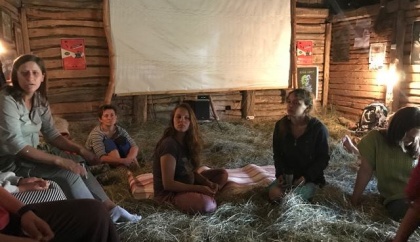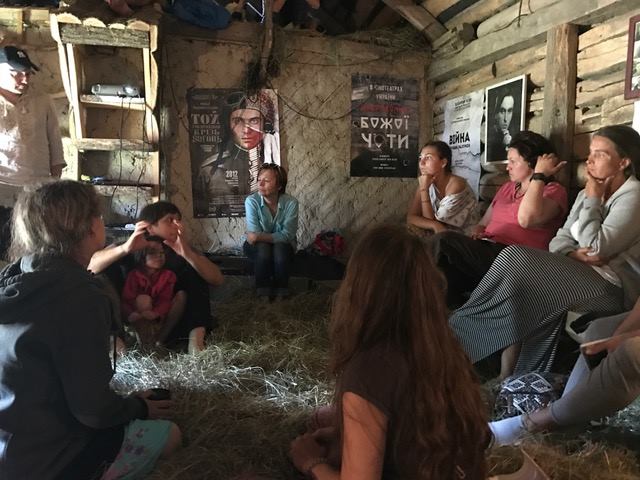
In the early July, the Kyiv DOCU/CLUB at the Start Now School of Business and Development for Teenagers screened films in Polissia.
For the third year in a row, the artistic hamlet of Obyrok hosts the Educational Experiment family camp. In a pine forest near a pristine lake, a tent camp springs up. Adults combine experience exchange with family vacation. Children spend their time engaging in creative activities, quests, swimming and play. The platform unites everyone who cares about the situation with education in our country.
This year, the camp’s program included two screenings of documentary films from the Docudays UA film club collection: Please Vote for Me (dir. Weijun Chen) and Blossom with Tears (dir. Huaqing Jin). The DOCU/CLUB project was presented by Tetiana Patokova and Inna Bayeva, the experienced moderators of Kyiv Docudays UA film club at the Start Now School of Business and Development for Teenagers.
After the lively discussion of the films, our colleagues shared their impressions:
“It is the first time in their lives when they watched films sitting on hay, the first time when they discussed it with adult audience, and what an audience it was — their parents, who gathered in Chernihiv region to discuss the problems of education. ‘What a scary film,’ whispered one of the youngest audience members into her father’s ear during the screening. The film Blossom with Tears by the Chinese director Huaqing Jin was watched by a mixed child-adult audience in the Educational Experiment’s film barn. However, the little participants did not share their impressions; probably they sensed that the adults really want to speak about it as soon as possible.”

“The discussion that was born after the film ended only because the next event was already ‘spurring’ them. And it is understandable, because we were talking about the most important thing in the world, that is, about children. The point of departure was, of course, the film. One audience member explained some aspects of Chinese life, learned during his long experience of working in China. He said that despite the cruelty of imposing responsibility for the whole family on the child, these families sincerely believe it benefits their children, because studying can open new opportunities and prospects to them, which their parents never had. And the whole family works very hard to pay for the child’s education. However, many viewers agreed with the little girl quoted above: the film left a very depressing feeling.
One audience member made an interesting comment that some scenes actually evoke a physically unpleasant feeling (for example, when the boy, bending in two, tries to crawl through a pipe fragment). But in general, for many, this film is about the need to seek constant feedback from the child. Thoughts about how important it is to watch and listen to the children, about how to learn to respect their choices and accept them, were articulated in various manners by almost all participants.
Everyone shared not just their thoughts, but their stories and examples, which were especially important and valuable. Of course, the atmosphere of trust and the corresponding attitude to the discussed topic could be felt at this place from the first moment (actually, the title Educational Experiments speaks a lot to it). And we hope that through emotional involvement, through sympathy for the characters of this film, our viewers felt the importance of conscious parenting and started thinking about the thin boundary in their own aspirations for achievements when they start to contradict their child’s interest and disagree with the development of a harmonious personality.”
More on the Educational Experiment see at the Project’s Facebook Page.
Photo courtesy of the Facebook Page of the Start Now School of Business and Development for Teenagers.
All news



